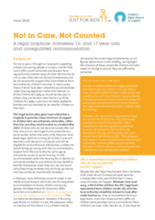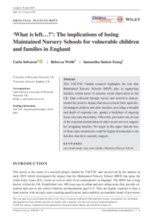

Displaying 511 - 520 of 1653
FICE Israel decided to initiate a short survey to document and share information about the way different countries handled their policies and practices in residential care facilities during that period. This report presents findings and some conclusions from this primary survey.
This advice seeks to support staff working in schools, colleges and childcare settings, to care for children in the safest way possible, focusing on measures they can put in place to help limit risk of the virus spreading within education and childcare settings.
This paper from Just for Kids Law (JfKL) explores an issue that the organization has come across through their work: cases of under 18s (mainly 16- and 17-year olds) in the UK who are facing homelessness and do not receive the support they are entitled to from local authority children’s services.
This research project aimed to study and inform the effective use of Pupil Premium Plus (PP+)-funded interventions to support educational outcomes for looked after children in the UK.
Drawing on the narratives offered by child and family social workers, this paper considers a series of possible explanations for Northern Ireland (NI)'s significantly lower out of home care rates.
This analysis focuses on the case of Pedersen et al. v. Norway, where the European Court of Human Rights (ECtHR, Court) addressed the issues of adoption and post-adoption contact.
This TACTYC funded research highlights the role that Maintained Nursery Schools (MNS) play in supporting families within areas of extreme social deprivation in the UK.
In this opinion piece for the Guardian, Christine Berry explores the ways in which child care work is undervalued and underfunded, despite the economy's dependence on childcare both paid and unpaid, and notes that, while the coronavirus lockdowns expose these issues, little attention is being paid.
UK charity Voices from Care Cymru (VFCC) has warned that children in care are particularly vulnerable during the coronavirus lockdowns due to lack of access to basic technology which prohibits them from staying in touch with important support networks, according to this article from BBC News
For this study, the researchers interviewed unaccompanied minor refugees (UMRs) in two youth asylum-centres in rural Sweden.




